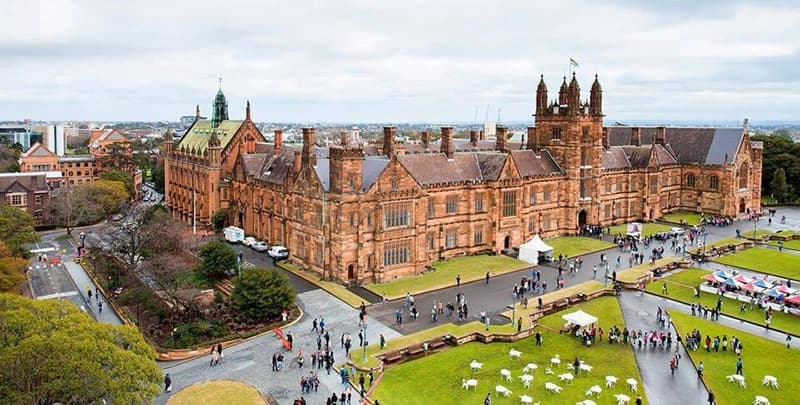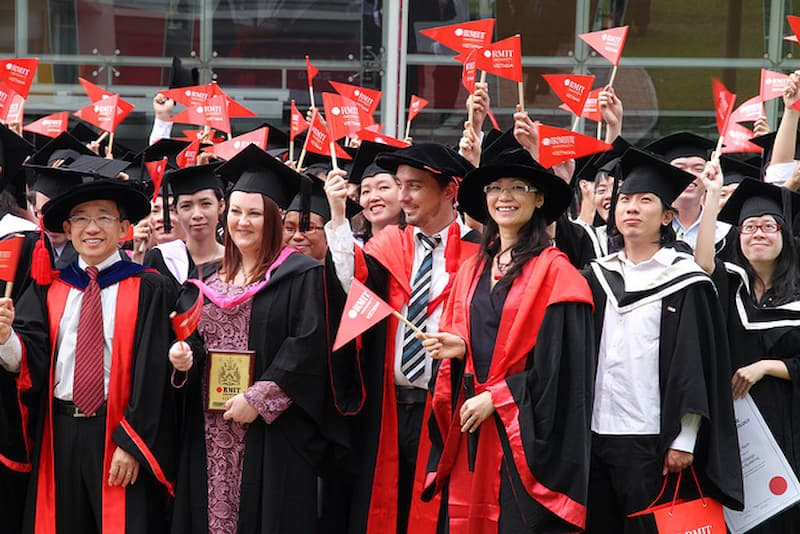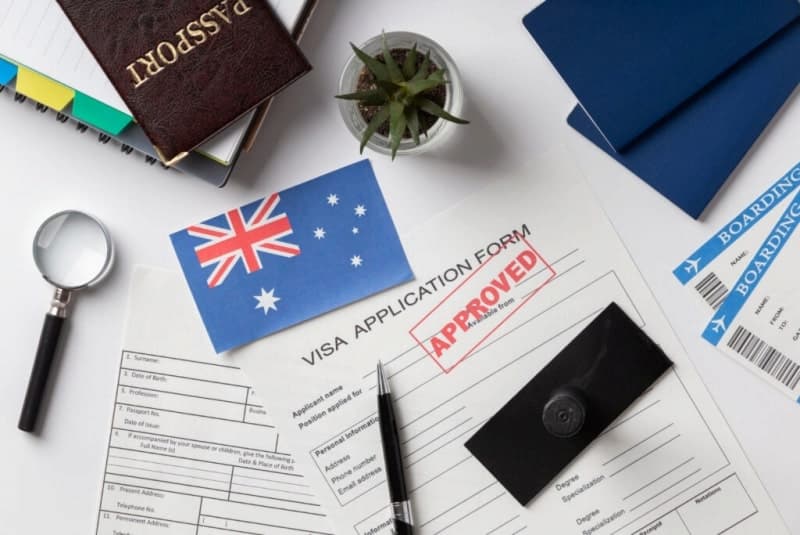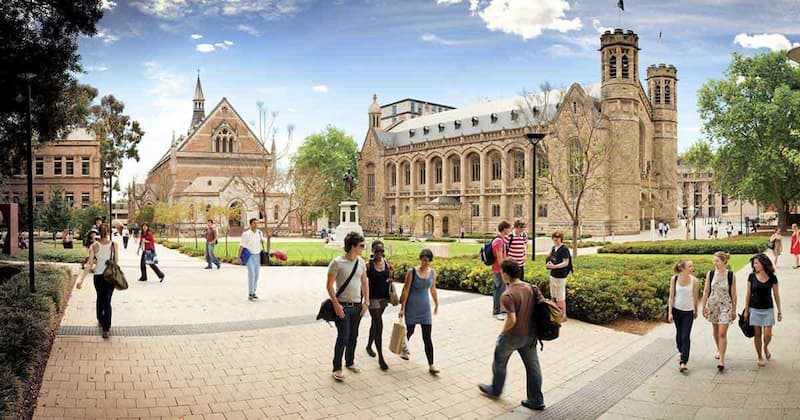Get free consultation
Fill out the form and we will contact you
Studying in Australia is increasingly popular and has become a new trend among many Vietnamese students. The country offers diverse study options, from vocational training, summer study programs, and work-study models to undergraduate and postgraduate degrees, all at a cost that is relatively affordable compared to other developed nations. If you are considering studying in Australia, it is essential to understand the requirements, procedures, and costs involved.
Is choosing the land of kangaroos the right decision for your education? Below are some advantages and limitations of studying in Australia that you should carefully consider:
Australia is one of the top destinations for international students in the Asia-Pacific region, offering a number of benefits:
A world-class education system with more than 40 universities ranked among the top 100 globally. The teaching approach emphasizes critical thinking and practical application, with globally recognized qualifications and a modern, dynamic learning environmen.
A wide range of academic pathways, including summer programs, vocational training, undergraduate, and postgraduate studies. Popular fields include business, IT, media, tourism, education, design, and nursing,...
A safe and multicultural environment that makes it easy to adapt, with English as the main language for study and daily communication, ensuring a high quality of life.
Excellent post-graduation opportunities, with the option to stay in Australia for 2–4 years under the Temporary Graduate Visa (subclass 485) or even pursue permanent residency. During studies, students are allowed to work up to 24 hours per week and full-time during official breaks.
Access to generous scholarship schemes, ranging from partial to full scholarships covering 25–100% of tuition fees. Notably, postgraduate research scholarships and tuition fee waivers are available for outstanding students.
The education system in Australia is of high quality, with many universities ranked among the world’s top institutions.
Alongside the opportunities, studying abroad in Australia also comes with certain challenges:
Tuition fees are high, ranging from 25,000 – 40,000 AUD per year, and living expenses range from 20,000 – 25,000 AUD per year. For those studying and working part-time in Australia, the overall cost may be slightly lower, but it requires working to cover expenses.
Language barriers in communication, as the local Australian accent can be quite heavy. Presentations and academic discussions may feel stressful.
Cultural shock regarding lifestyle, habits, schedules, and sometimes even experiences of racial discrimination.
Heavy academic workload, with difficulties in adapting to methods emphasizing critical thinking and independent research.
Intense competition for part-time jobs within the 24-hour-per-week limit for international students, often involving manual work such as dishwashing, serving, or sales.
Expensive housing in major cities like Sydney and Melbourne, where newcomers may face rental scams or poor living conditions.
Immigration policies and student visa regulations change frequently, requiring constant updates to avoid violations and ensure rights are protected.
To pursue studies in Australia across all current academic programs, students must meet the following specific criteria:
A valid Vietnamese passport.
A student visa for Australia granted in accordance with the chosen academic level.
Parents, relatives, or a guarantor to ensure financial support and act as a contact when needed.
Valid financial proof documents in Australia.
Good health, and a clean criminal record without involvement in social evils, criminal offenses, or prior convictions in Vietnam.
Good health and a clean background are essential to qualify for studying in Australia
Australia’s education system sets out policies for awarding qualifications based on a comprehensive framework that covers different study levels. The specific requirements for each level of study in Australia are as follows:
If you choose the vocational study pathway in Australia, you need to meet the following conditions:
Age between 15 and 45, categorized into labor groups A, B, and C.
English proficiency at IELTS 5.5; if not available, you will need to take a placement test and interview with the school.
Completion of grade 11 or 12, or graduation in Vietnam.
Academic performance with an average score of 6.0 or higher.
Relevant vocational certificates (if any).
Proof of financial capacity to cover vocational study in Australia, including tuition fees, accommodation, insurance, or savings of at least 650 million VND.
To pursue a bachelor’s degree in Australia, applicants must meet the following:
High school graduation with a GPA of 6.5 or above. For majors such as medicine, law, or engineering, a higher GPA is required.
IELTS score of 6.0 or higher; for fields like medicine, nursing, or education, a minimum of 7.0 is required.
Financial proof covering tuition fees from 25,000 – 40,000 AUD per year and living expenses of 24,505 AUD per year. Financial stability must be demonstrated through a savings account under the sponsor’s name or via scholarships (if available).
Meeting the basic requirements for undergraduate studies in Australia
For postgraduate programs such as a master’s degree in Australia, applicants need to meet the following conditions:
A bachelor’s degree from a recognized university in Vietnam or abroad. A GPA ranging from 6.5 – 8.0/10 is typically required. For those applying outside their previous field of study, a bridging course may be necessary.
An IELTS certificate of 6.5 or higher; for disciplines such as education, nursing, or law, a minimum of 7.5 is required.
Between 1 – 3 years of work experience is often required for programs such as MBA, master’s in management, or applied engineering.
Proof of financial capacity, including tuition fees ranging from 28,000 – 45,000 AUD per year and living expenses of 24,505 AUD per year. This must be supported by a savings account, income verification documents from the applicant or sponsor, or scholarships (if applicable).
When you plan to study in Australia, it is important to understand the expenses that international students need to prepare for in order to cover both education and living costs, including:
This is only a basic reference cost, in reality there are many changes. Depending on the school and the city you live in, expenses may vary more or less. For example, in Sydney and Melbourne, living and housing costs are more expensive compared to cities like Canberra, Brisbane, or Adelaide.
Studying in Australia requires very important paperwork. The basic steps you need to research and prepare thoroughly for this process includegồm:
Researching schools, programs, and training in Australia needs to be aligned with your personal academic goals. Below are some of the best high schools and universities in Australia highly rated by international students.
Quality education institutions for studying abroad in Australia
Melbourne High School - Victoria.
Mac Robertson Girl High School - Victoria.
James Ruse Agricultural High School - New South Wales.
North Sydney Boys High School / North Sydney Girls High School (NSW).
Sydney Grammar School (private, New South Wales)
Presbyterian Ladies’ College (PLC Sydney or Melbourne)
Wesley College (Melbourne)
Brisbane Grammar School - Queensland.
Trường St Peter’s College - Adelaide, South Australia.
The University of Melbourne: top 1 in Australia, top 15 worldwide.
The Australian National University (ANU): top 1 in Australia and top 30 worldwide.
The University of Sydney: top 3 in Australia and 18 worldwide.
The University of New South Wales (UNSW Sydney): top 20 worldwide.
Monash University: top 5 in Australia.
The University of Queensland.
RMIT University Melbourne.
University of Technology Sydney.
Deakin University.
Griffith University.
RMIT University ranks among the top 10 quality universities in Australia
If you plan to study in Australia, you need to complete the enrollment application process according to the specific requirements of each institution. The basic steps include:
Submit an application: Send your application form along with required documents such as transcripts, English certificates, letters of recommendation, study plan, and essay.
Wait for the school’s acceptance letter: If you are accepted, the school will issue an offer letter and other documents necessary for your visa application.
To apply for a student visa in Australia, you can either go through an agency or apply by yourself. The required documents include:
Passport: Must be valid for at least 6 months from the expected date of entry.
Student visa application form: Complete accurately with all required information.
Passport photos: Must meet embassy standards.
Acceptance letter from the school: The official offer letter from the university you applied to.
Proof of financial capacity: Provide documents showing sufficient funds to cover tuition fees and living expenses during your studies in Australia.
Health examination certificate: Must be issued by a hospital approved by the Australian Embassy.
English proficiency certificate: IELTS, TOEFL, or other recognized tests with scores that meet the requirements of your program.
Prepare all necessary documents for an Australian student visa
After preparing all the required documents, you will need to submit your application at the Australian Embassy or Consulate and attend an interview if required. The processing time may take several weeks as officers review and verify the information provided. Once your Australian student visa is granted, you should prepare your luggage and essential documents for enrollment.
During the process of exploring study opportunities in Australia, you may encounter many questions that need clarification. Some common ones include:
Yes. Whether you enroll in vocational training, undergraduate, or postgraduate programs in Australia, financial proof is required. This typically includes tuition fees, living expenses, return airfare, and OSHC (Overseas Student Health Cover).
Accepted forms of financial proof include savings accounts in your name or your sponsor’s, evidence of income (employment contracts, payslips, business registration), and other assets (real estate, vehicles, precious metals, or jewelry).
The total annual cost of studying in Australia ranges from AUD 50,000 to AUD 80,000, including both tuition fees and living expenses.
Currently, international students in Australia often choose popular and well-regarded fields such as social sciences, management, mathematics, clinical medicine and pharmacy, physics, information technology, natural sciences, and law,...
Medicine, law, management, and engineering are among the top fields attracting international students in Australia
If you wish to study in Australia, all academic levels require proof of English proficiency, with a minimum IELTS score of 5.5. Other equivalent certificates such as TOEFL, PTE, or C1 are also accepted. The higher the level of study, the higher the required score.
Quoctichthuhai.com is a professional consultancy specializing in study abroad programs in Australia, visa processing, financial proof documentation, settlement procedures, and family visit visas. With many years of experience, our team has strong expertise and in-depth knowledge of legal procedures.
We provide clear roadmaps and personalized guidance, helping students and parents choose suitable schools and study programs. All procedures and documents for visa applications and financial proof are ensured to be complete and accurate. Our clients’ applications for student visas, family visit visas, and permanent residency are processed quickly and efficiently. Contact us today for a free consultation and a detailed quote on study abroad and settlement programs in Australia.
Fill out the form and we will contact you







